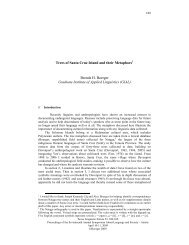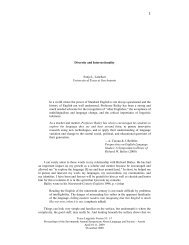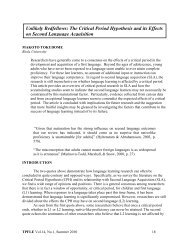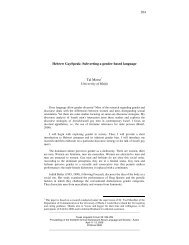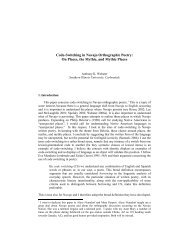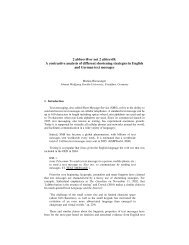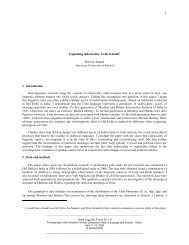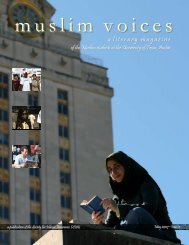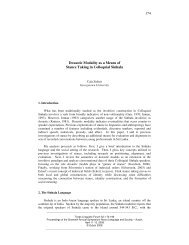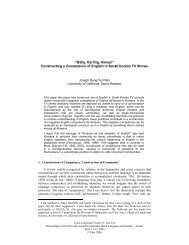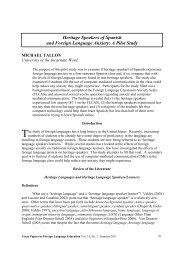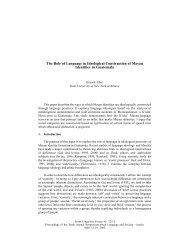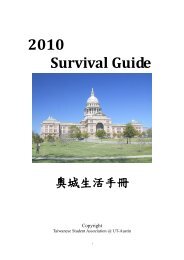The Impact of Bilingual Education on Indigenous Language and ...
The Impact of Bilingual Education on Indigenous Language and ...
The Impact of Bilingual Education on Indigenous Language and ...
You also want an ePaper? Increase the reach of your titles
YUMPU automatically turns print PDFs into web optimized ePapers that Google loves.
Tapirape culture <strong>and</strong> believes that it will be slowly lost. A related issue involves the<br />
maintenance <str<strong>on</strong>g>of</str<strong>on</strong>g> the native language, as illustrated by excerpt 9:<br />
(9) We have been mixing our language with Portuguese. We didn’t use to do this but,<br />
nowadays, there are a lot <str<strong>on</strong>g>of</str<strong>on</strong>g> words that we d<strong>on</strong>’t have in our language. Children<br />
are hearing these words in Portuguese, in school <strong>and</strong> other places, <strong>and</strong> using them<br />
in the Tapirape language. (Ieremy’i Tapirape, cited above)<br />
Despite the emphasis <strong>on</strong> teaching in Tapirape, Portuguese has gained prestige in<br />
the community. <str<strong>on</strong>g>The</str<strong>on</strong>g>re has been an increase <str<strong>on</strong>g>of</str<strong>on</strong>g> code switching. Although this has not yet<br />
affected the vitality <str<strong>on</strong>g>of</str<strong>on</strong>g> the indigenous language, interviewees argue that it threatens their<br />
language, <strong>and</strong> they have identified the school as the culprit <str<strong>on</strong>g>of</str<strong>on</strong>g> this phenomen<strong>on</strong>. <str<strong>on</strong>g>The</str<strong>on</strong>g><br />
interviewees are aware that their language is in c<strong>on</strong>flict with a majority language <strong>and</strong> that<br />
school has an important role in c<strong>on</strong>trolling or not c<strong>on</strong>trolling the code-switching that is<br />
taking place.<br />
<str<strong>on</strong>g>The</str<strong>on</strong>g> negative evaluati<strong>on</strong>s c<strong>on</strong>sidered here focus <strong>on</strong> the changes to the traditi<strong>on</strong>al<br />
lifestyle that have been brought about by bilingual schooling. But although the Tapirape<br />
leaders point out these problems, this does not imply that they do not want a school in the<br />
village. <str<strong>on</strong>g>The</str<strong>on</strong>g>ir c<strong>on</strong>cerns simply illustrate the c<strong>on</strong>flicts inherent in the school as a place<br />
where two different worlds are in c<strong>on</strong>tact – the indigenous <strong>and</strong> the n<strong>on</strong>-indigenous.<br />
4. Tapirape evaluati<strong>on</strong> as indicati<strong>on</strong> <str<strong>on</strong>g>of</str<strong>on</strong>g> multiple identities <strong>and</strong> representati<strong>on</strong>s<br />
<str<strong>on</strong>g>The</str<strong>on</strong>g> evaluati<strong>on</strong>s cited above reveal the “antag<strong>on</strong>istic representati<strong>on</strong>s”<br />
(Woodward, 2000) with which the Tapirape people view their school <strong>and</strong> its effects <strong>on</strong> the<br />
community. <str<strong>on</strong>g>The</str<strong>on</strong>g> positive <strong>and</strong> negative points <str<strong>on</strong>g>of</str<strong>on</strong>g> view suggest that the process <str<strong>on</strong>g>of</str<strong>on</strong>g><br />
c<strong>on</strong>structing bilingual schooling is complex <strong>and</strong> multifaceted. As a n<strong>on</strong>-indigenous<br />
instituti<strong>on</strong>, a school must be appropriated by the indigenous people it serves as well as rec<strong>on</strong>structed<br />
c<strong>on</strong>tinuously in order to be truly effective; however, c<strong>on</strong>flicting priorities <strong>and</strong><br />
interests are an unavoidable part <str<strong>on</strong>g>of</str<strong>on</strong>g> the process. <str<strong>on</strong>g>The</str<strong>on</strong>g> positive <strong>and</strong> negative evaluati<strong>on</strong>s <str<strong>on</strong>g>of</str<strong>on</strong>g><br />
the interviewees come both from the process <str<strong>on</strong>g>of</str<strong>on</strong>g> c<strong>on</strong>structing or shaping the school itself as<br />
well as from the c<strong>on</strong>structi<strong>on</strong> <str<strong>on</strong>g>of</str<strong>on</strong>g> its meaning within the community. Meaning is<br />
c<strong>on</strong>structed from a set <str<strong>on</strong>g>of</str<strong>on</strong>g> representati<strong>on</strong>s (Woodward, 2000), <strong>and</strong> can itself be c<strong>on</strong>sidered a<br />
representati<strong>on</strong>, but these representati<strong>on</strong>s are not homogeneous within the community or<br />
even within individuals, as illustrated by the positive <strong>and</strong> negative evaluati<strong>on</strong>s <str<strong>on</strong>g>of</str<strong>on</strong>g> the<br />
Tapirape school presented here.<br />
<str<strong>on</strong>g>The</str<strong>on</strong>g>se c<strong>on</strong>flicting evaluati<strong>on</strong>s can be understood to reflect c<strong>on</strong>flicting <strong>and</strong><br />
antag<strong>on</strong>istic aspects <str<strong>on</strong>g>of</str<strong>on</strong>g> Tapirape identity. On <strong>on</strong>e h<strong>and</strong>, those interviewed are in favor <str<strong>on</strong>g>of</str<strong>on</strong>g><br />
the Tapirape school because it helps them preserve their native culture <strong>and</strong> language, as<br />
well as providing a means to learn the n<strong>on</strong>-indigenous language, to underst<strong>and</strong> Brazilian<br />
<strong>and</strong> world cultures, <strong>and</strong> to assist them in their fight for their rights. On the other h<strong>and</strong>, they<br />
are against the school because it threatens their culture by introducing Portuguese <strong>and</strong> by<br />
taking time away from the family’s educati<strong>on</strong> <str<strong>on</strong>g>of</str<strong>on</strong>g> their children. <str<strong>on</strong>g>The</str<strong>on</strong>g>se different points <str<strong>on</strong>g>of</str<strong>on</strong>g><br />
______________________________________________________________________<br />
Texas Linguistic Forum 52: 59-69<br />
Proceedings <str<strong>on</strong>g>of</str<strong>on</strong>g> the Sixteenth Annual Symposium About <strong>Language</strong> <strong>and</strong> Society – Austin<br />
April 11-13, 2008<br />
© Gorete Neto 2008<br />
___________________________________________________<br />
67



